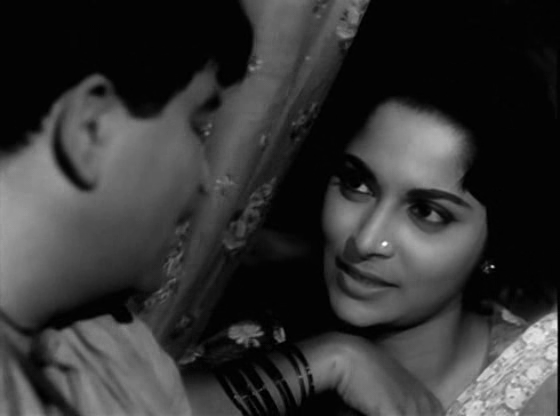* Crew Of Movie
- Director - Basu Bhattacharya
- Story & Dialogue - Phanishwar Nath Renu
- Screenplay - Nabendu Ghosh
- Producer - Shailendra
- Editor - G. G. Mayekar
- Cinematographer - Subrata Mitra
- Art Director - Desh Mukherjee
- Costume and Wardrobe - Hanuman, Pandit Shivram
- Choreographer - Lachhu Maharaj
- Music Director - Shankar Jaikishan
- Lyricist - Hasrat Jaipuri, Shailendra
- Playback Singers - Asha Bhosle, Manna Dey, Suman Kalyanpur, Lata Mangeshkar, Mubarak Begum, Mukesh, Shambhu, Shankar
*Awards
1967 National Film Award for Best Feature Film
1967 Moscow International Film Festival: Grand Prix - Nominated
Story Plot
The plot centers on Hiraman, a rustic villager from a remote village in Bihar, who drives a bullock cart to earn his livelihood. The story begins with Hiraman taking two consecutive vows based on difficult situations in his life. He then meets a nautanki dancer named Hirabai. The story then evolves into one of the friendship between a bullock cart driver and an urban nautanki dancer. The movie, finally, ends with Hiraman taking a third vow.
Hiraman (Raj Kapoor) is a bullock cart driver with conservative traditional values. While smuggling illegal goods on his bullock cart and narrowly escaping the police, Hiraman takes a vow (the first Kasam) to never carry illegal goods again in his cart. While subsequently transporting bamboo for timber trader on his bullock cart, he is beaten by two men when their horses are upset by the bamboo in the cart. After that incident, Hiraman takes another vow (the second Kasam) to never carry bamboo again in his cart.
One night Hiraman is asked to carry Hirabai (Waheeda Rehman), a nautanki dancer, as a passenger to a village fair 40 miles away. As they travel together Hiraman sings to pass the time and tells her the story of the legend of Mahua. As the journey progresses, Hirabai is mesmerized by Hiraman's innocence and his simple philosophy of life. Hiraman in return sees her as an angel of purity.
Once they reach the village fair, Hiraman joins with his band of bullock cart drivers and Hirabai joins the nautanki company. Hirabai asks Hiraman to stay at village fair for a few days to see her dance. Hirabai arranges free passes for Hiraman and his friends to see nautanki on every night as long as village fair runs.
As Hiraman attends nautanki, he becomes aware that other people see her as a prostitute, which disturbs him. He tries to shield and protect her from society. The bond between two grows stronger as the days pass at the fair. He gets involved in fights with local people who speak badly about her and her profession. Hirabai tries to make him understand the harsh reality of her life. Hiraman asks her to leave her profession and start living a respectable life. Hirabai refuses to leave her acting career. Depressed, Hiraman leaves village fair and returns to his village.
In the meantime, Hirabai understands Hiraman's unselfish love. Hirabai meets Hiraman and reveals her past secret that she had been already sold and she was no longer a virgin beauty. Hirabai returns to her hometown. After seeing Hirabai going away from his life, Hiraman takes third vow (teesri Kasam) to never carry a nautanki company dancer again in his cart.
All songs
Music Details
All lyrics written by Shailendra & Hasrat Jaipuri, all music composed by Shankar-Jaikishan.
| No. | Title | Lyrics | Singer(s) | Length | |
|---|---|---|---|---|---|
| 1. | "Aa Aa Bhi Jaa" | Shailendra | Lata Mangeshkar | 5:03 | |
| 2. | "Chalat Musafir" | Shailendra | Manna Dey | 3:04 | |
| 3. | "Duniya Bananewale" | Hasrat Jaipuri | Mukesh | 5:03 | |
| 4. | "Haye Ghazab Kahin Tara Toota" | Shailendra | Asha Bhosle | 4:13 | |
| 5. | "Maare Gaye Gulfaam" | Hasrat Jaipuri | Lata Mangeshkar | 4:00 | |
| 6. | "Paan Khaye Saiyan Hamaaro" | Shailendra | Asha Bhosle | 4:08 | |
| 7. | "Sajanwa Bairi Ho Gaye Hamar" | Shailendra | Mukesh | 3:51 | |
| 8. | "Sajan Re Jhoot Mat Bolo" | Shailendra | Mukesh | 3:43 | |
| 9. | "Lali Lali Doliya Mein Lali Re" | Shailendra | Asha Bhosle | 3:11 |
Movie


.jpg)
No comments:
Post a Comment